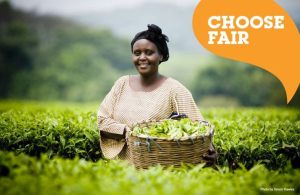A Fair Trade World
This is a look at Fair Trade and its impact on the lives involved. Does it work, or is it just a marketing scheme?
This has been a question asked by many over the past several years. But first we must realize that there are reasonable questions and not so reasonable questions. I had the opportunity to listen in on a Fair Trade (FT) debate held at JBU where the moderator asked the former CEO of Ten Thousand Villages a very interesting question. He asked “Can you site a specific example or time where Fair Trade impacted a community to such a degree that they began producing Mercedes Benz cars or something else of a larger scale?” This is what I call an unreasonable and loaded question that the moderator already knew the answer to. We do not claim Fair Trade to be the one stop shop that will end poverty as we know it. But we do claim that it has helped millions around the world make a sustainable living and even if it has only helped a few thousand people, I would still be very excited. When you look at the history and track record of Fair Trade, you cannot help but realize the many successes behind the model. Without this success it simply would not exist today! Do we really believe that farmers and artisans all around the world would be participating in FT if they did not directly experience a significant benefit to their livelihoods? However, this does not mean that the model doesn’t need any changes or modification as time goes on? As markets change and trading takes different shapes, we will have to see FT continue to adapt to the farmers and artisans best interest. Let’s keep in mind, Fair Trade is all about helping the poor of this world survive.
When you open the history books of FT you see something very unique; true relationship building directly with the beautiful people of these developing countries. Those relationships have lasted for many years and have been built upon trust, transparency and an ongoing relationship that has always brought benefit and growth to these families and communities. FT does not promise to eradicate poverty, we will always have poor with us. But it does promise to help them, and that is my goal in doing FT development, helping my neighbor make it through this life. My goal is not to industrialize the developing world, but rather to help them realize the financial benefits of their existing skill sets and to help them market those skills, thus creating economic opportunity for one individual at a time. How far must I look to see
both financial and social benefits from FT in the developing world? How about the Co-ops utilizing FT that I have purchased coffee from in South America, like “La Florida” in Peru or “UCASUMAN RL” in Nicaragua. Both democratically run organizations state clearly how they have benefitted from FT along with clear community enhancements to show further support. These are two groups that I not only get a wonderful product from, but I see individuals and families thriving on a higher level. Other farmers around the world readily explain that FT has lessened poverty for their people. The key word here is “lessen”, not eliminate nor eradicate; we do not claim that FT will launch a country into economic victory. We simply claim that it’s a piece of the puzzle and the most viable option to truly reach down and help those in need. Not only are there ample results of FT success, but with that comes much history starting back in the mid 1950’s.
“We can help the poor and needy through our everyday purchases and in doing so, show them we care. The real question is, do we truly care enough to actually alter our spending habits?”
When Edna R. Byler started selling needlework after she saw the needs of Puerto Rican women on her visit there in 1946. Edna set out on her quest to sell their products and reinvest the funds back into Puerto Rico to help these women make a living. Who knew, that this small endeavor from a caring woman to help these people make a viable living, would one day be known as Ten Thousand Villages, one of the largest FT organizations today that connects and helps millions around the world by following in Edna’s footsteps and is actually caring for the people struggling to survive in this world.
There is no question on the success of FT: the real question is, do we truly care enough about the poor in this world to actually be moved to action by altering our spending habits? When I stop and think about this for a moment, it feels very satisfying to purchase a Fair Trade product and to know that people in developing countries were helped. My purchase helped empower them to provide for their family and helped a person survive another day. The honor is mine!
So I encourage everyone that I can to support the poor through the purchasing of their goods, this does not give anyone a free ride but rather reinforces behavior to continue utilizing their skills to provide for their families. This is truly a viable way to help people all over the world make a sustainable living. So join us and choose to help the poor with your dollars starting today!
Please visit us at fairtradeforums.net to view impact studies and learn more about how Fair Trade is helping many around the world.


February 11, 2013 at 4:54 pm
But it is not the only way in which we can support those that feed us.
http://redbarcelona.wordpress.com/2013/02/10/farmers/